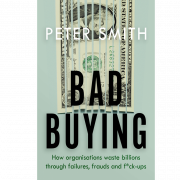Support to Disadvantaged Suppliers Attracts Fraudsters
Programmes to support minority owned businesses, smaller firms, social enterprises and the like via public sector procurement have become increasingly popular over recent years in many countries. The Social Value Act in the UK in 2012 made this sort of action more prevalent in the UK, but the USA is probably where such schemes are longest established.
However, the irony is that the more successful such programmes are in terms of actually directing spend towards such suppliers, the greater the temptation for fraud and corruption to spring up. Genuine firms that need support might lose out to unscrupulous criminals and conmen/women.
One mechanism for that is basically using what we might call “non-value for money” evaluation criteria to award contracts to a supplier that doesn’t really deserve them. That can lead to distortion in the selection of winning bidders. “This firm’s bid wasn’t the cheapest but they are a small firm / owned by a women / promise to employ lots of disabled local people. That gave them lots of marks for “social value” in the bid evaluation”. What isn’t made public is that the firm is also owned by the budget holder or decision maker’s sister-in-law.
The other quite common fraud is where a firm is apparently owned by a person or people who qualify as a “minority” but in fact, control rests with non-minority owners. We have seen that a lot in the USA and also in countries such as South Africa which have had schemes to give preference to black-owned businesses in public procurement. I gave several examples of this in the Bad Buying book from both of those countries.
But this is still going on – a recent report in the Chicago Tribune highlighted a current case. It is not clear yet which of those two mechanisms is suspected here; is it disguised ownership or the use of minority programmes to favour a firm for improper reasons? But federal prosecutors are “investigating possible minority-contracting fraud involving a series of Chicago government contracts worth hundreds of millions of dollars, including many with ties to a clout-heavy trucking and recycling company owner, according to sources and documents obtained by the Tribune”.
James Bracken and his wide Kelly own several companies engaged in construction, waste management and transportation. Investigators have asked city agencies for copies of bid documents and more relating to several contracts and for information relating to the city’s women and minority owned “set aside” programmes.
The programmes started in 1990 with the aim of awarding at least 25% of the total value of all city contracts to minority businesses and 5% to women-owned operations. But there have been accusations of fraud from the beginning. Company owners, chasing multimillion-dollar contracts, have put up phony “frontpeople” to get certified as minority or women-owned. Another route is to claim that a high percentage of work will got to minority subcontractors. In my experience, that is the sort of claim that rarely gets checked once a contract is operational!
A lot of this comes down to procurement carrying out the appropriate due diligence and checking out firms at the bidding stage, managing contracts well once they are operational, and of course keeping an eye out for conflicts of interest and other potential drivers of corruption. It is a constant battle between the forces of good (procurement, usually) and evil (certain dodgy potential suppliers and general low-life scum!)










Leave a Reply
Want to join the discussion?Feel free to contribute!